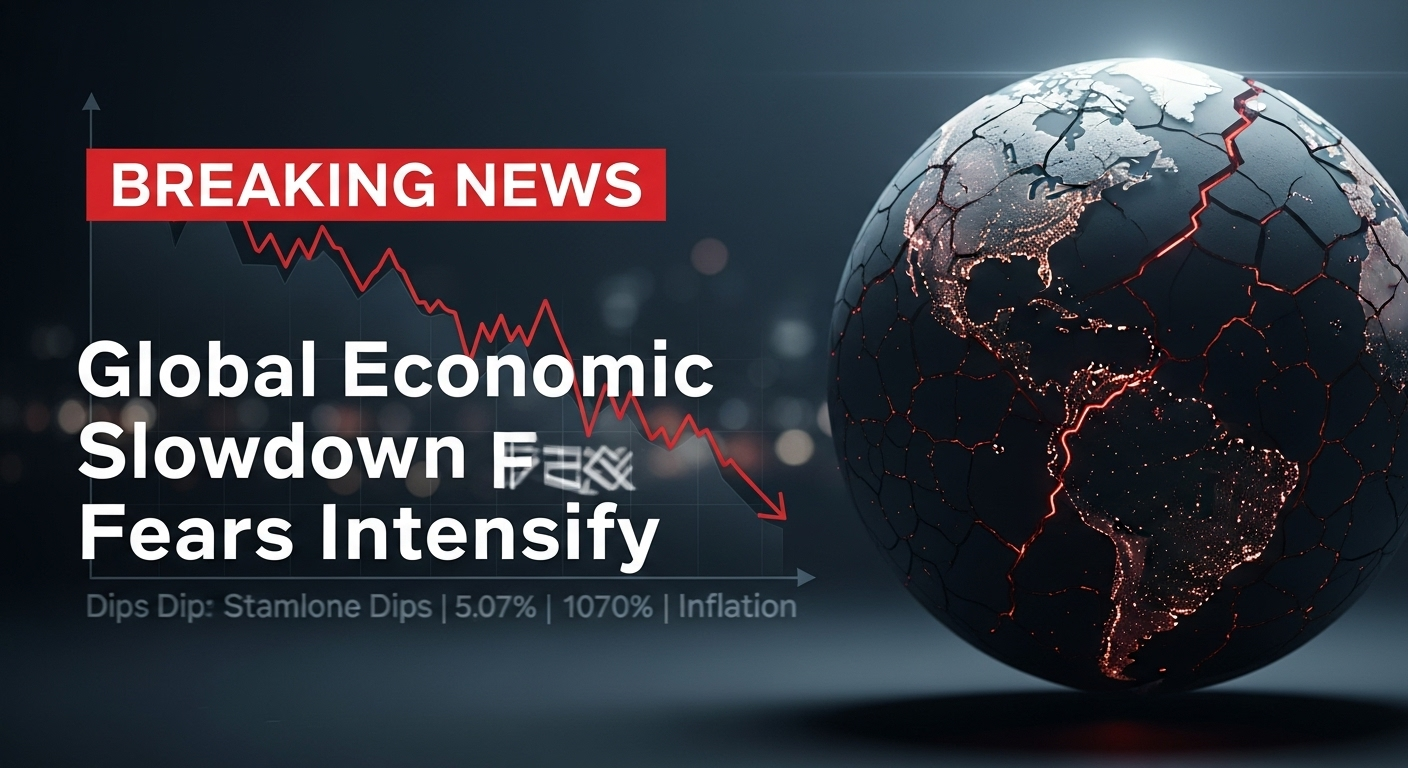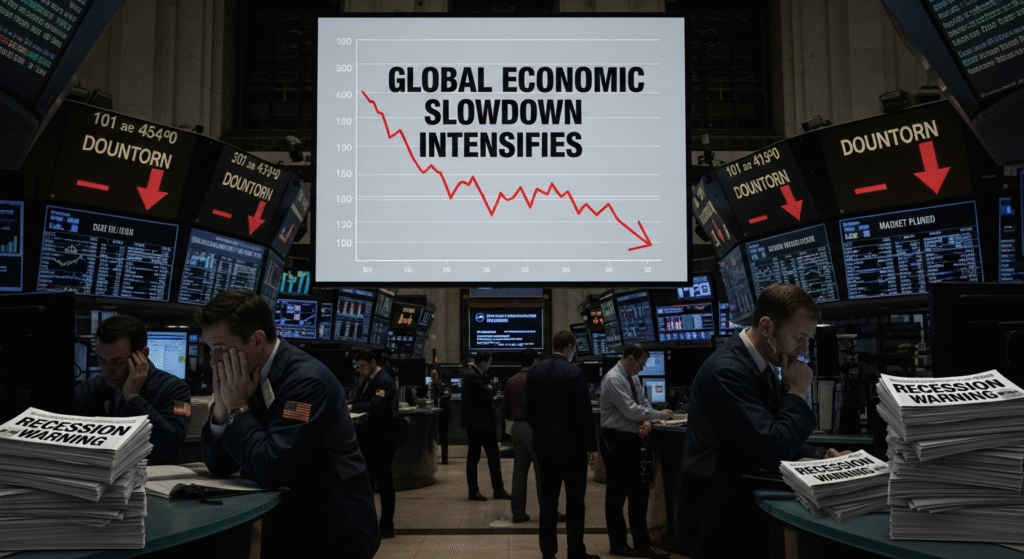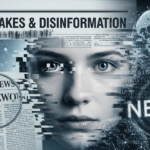Okay, let’s talk about something a little… unnerving. The global economy. Specifically, the increasingly loud whispers – or maybe they’re shouts now? – about a significant slowdown. I’ve got to admit, economic indicators usually put me to sleep, but even I’m starting to pay attention. And not in a good way.
It’s not just one thing, is it? It’s a whole stew of problems bubbling away. Inflation stubbornly refusing to vanish entirely, interest rates doing that awkward limbo dance of “how high can we go without breaking everything?”, and geopolitical tensions adding a lovely sprinkle of uncertainty on top. Fun times!
But here’s the thing – and it’s a point I keep coming back to: economic models? They’re just models. They don’t predict the future. They give a range of possibilities based on current data. So, when everyone starts saying “recession is inevitable,” I get a little twitchy. Because history has shown us, over and over, that the economy is a far more chaotic and unpredictable beast than any spreadsheet can capture. Though gaming can capture chaotic and unpredictable beast than any spreadsheet can capture. And if you are interested in Europe’s AI infrastructure then have a look at Europe’s AI infrastructure.
The Inflation Tightrope and Economic Slowdown

Inflation. Ugh. We were all hoping it would just… go away, right? Like a bad dream after too much pizza. But it’s proving to be a far more persistent houseguest. Central banks are stuck walking a tightrope: raise interest rates too much, and you crush economic growth. Don’t raise them enough, and inflation becomes entrenched. It’s a no-win scenario, really. And the consequences of getting it wrong? Well, that’s what fuels the economic slowdown fears.
And speaking of interest rates… remember when they were practically zero? Seemed like a dream, didn’t it? Now, mortgages are pricier, business loans are harder to secure, and everyone’s feeling the pinch. Actually, that’s not quite right. Not everyone. Some sectors are doing surprisingly well (luxury goods, anyone?). But for most folks, the rising cost of borrowing is definitely impacting spending habits. You might be wondering how much impact. Think about it this way: less spending means less demand, which in turn, can lead to businesses scaling back production and, yep, you guessed it… potential layoffs. And you can look at how cloud computing is being used at cloud computing.
Geopolitical Wildcards: More Than Just Headlines
But it’s not all about inflation and interest rates, oh no. Geopolitics is throwing some serious curveballs into the mix. Wars, trade disputes, political instability… it all adds up to a climate of uncertainty that makes businesses hesitant to invest and consumers nervous to spend. The frustrating thing is, these factors are largely outside of anyone’s control. We’re all just along for the ride, bracing ourselves for whatever happens next.
And let’s not forget supply chains. Remember when we were all obsessed with toilet paper shortages? (Okay, maybe that was just me.) But the disruptions caused by the pandemic, and exacerbated by geopolitical events, are still having ripple effects throughout the global economy. Getting goods from point A to point B is still more complicated and expensive than it used to be, and that impacts prices and availability. Simple as that.
Navigating Uncertainty: What Can We Actually Do?
So, what can we actually do about all this? Well, unless you happen to be a central banker or a global leader, probably not a whole lot directly. But that doesn’t mean we’re completely powerless. Individuals can focus on managing their own finances responsibly (easier said than done, I know). Businesses can try to be more resilient and adaptable. And governments… well, hopefully they can make wise decisions that don’t make things even worse! But, you know, no pressure.
I initially thought that technological innovation may help. But the world is still slow on technology adoption.
I keep coming back to the point that information is king and queen. Understanding what’s really happening, beyond the headlines, is crucial. Follow reputable sources, do your own research, and don’t just blindly accept everything you hear. Critical thinking is more important than ever in this environment.
FAQ: Breaking: Global Economic Slowdown Fears Intensify
How worried should I really be about a potential recession?
That’s the million-dollar question, isn’t it? The truth is, nobody knows for sure. Economic forecasts are notoriously unreliable. However, it’s wise to be prepared. This means having an emergency fund, reducing debt where possible, and being mindful of your spending. Don’t panic, but do be proactive.
What are some early warning signs of an economic slowdown?
Keep an eye on things like rising unemployment rates, declining consumer confidence, and a slowdown in manufacturing activity. Also, pay attention to what companies are saying in their earnings reports. Are they expressing caution about the future? Are they cutting back on investments? These can be indicators of trouble ahead.
How can I protect my investments during an economic downturn?
This is where it’s best to consult with a qualified financial advisor. Diversification is key – don’t put all your eggs in one basket. Consider investing in a mix of stocks, bonds, and other assets. Also, be prepared for volatility. Market downturns can be scary, but they can also present opportunities for long-term investors.
Why are global economic slowdown fears intensifying right now?
Several factors are contributing, including persistent inflation, rising interest rates, geopolitical instability, and supply chain disruptions. All these things create a climate of uncertainty that makes businesses and consumers more cautious, leading to a potential slowdown in economic activity. The interconnectedness of the global economy means that problems in one region can quickly spread to others. It’s a complex and challenging situation, to say the least.
Ultimately, the future is uncertain. But by staying informed, being prepared, and remaining adaptable, we can all navigate these challenging times with a bit more confidence.



